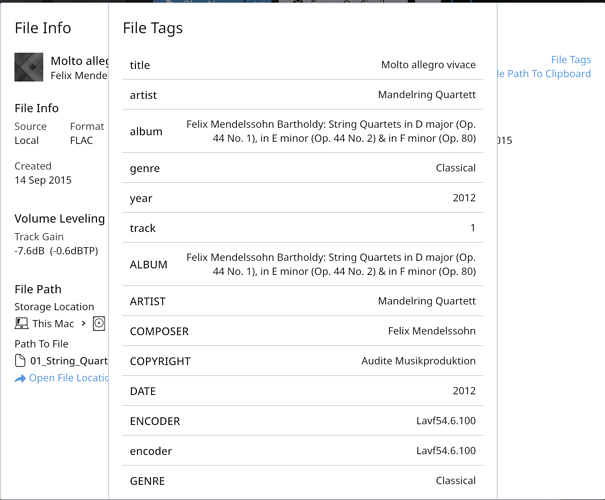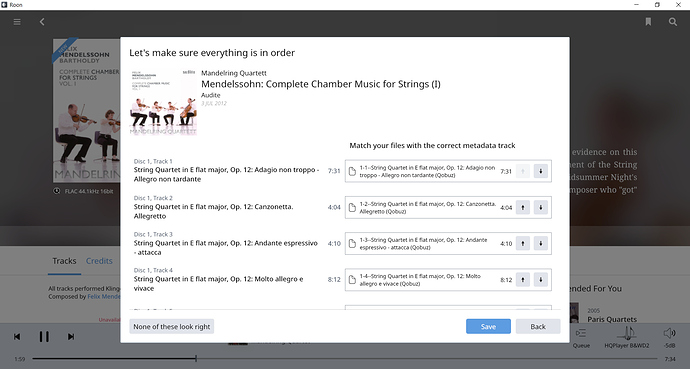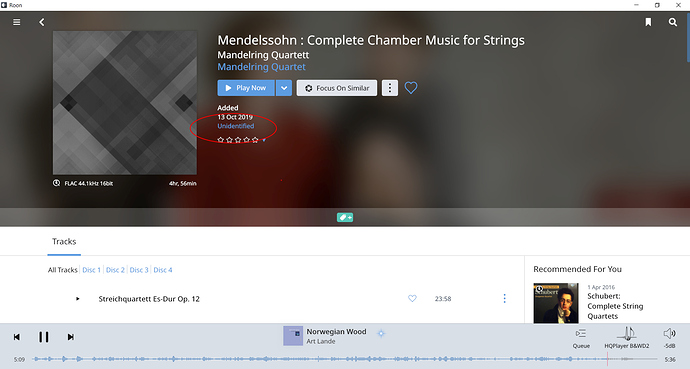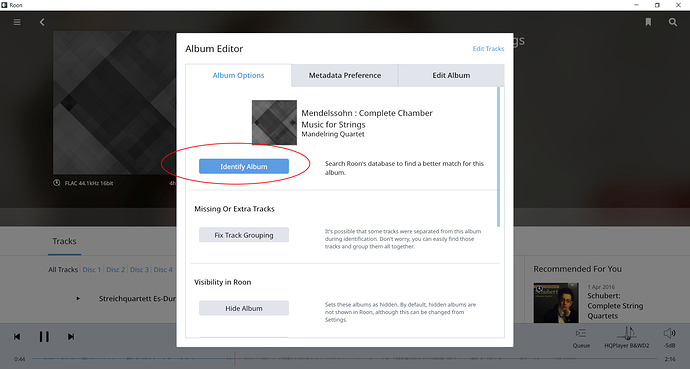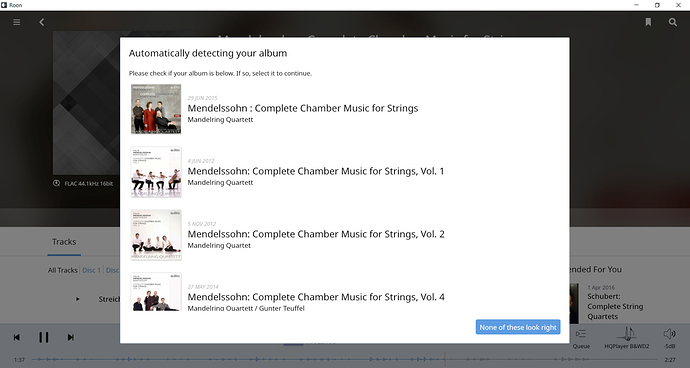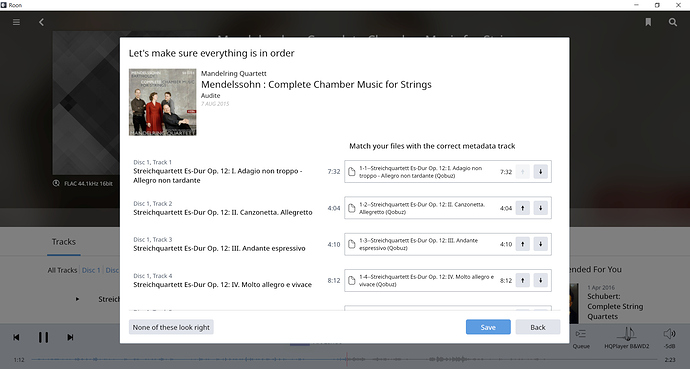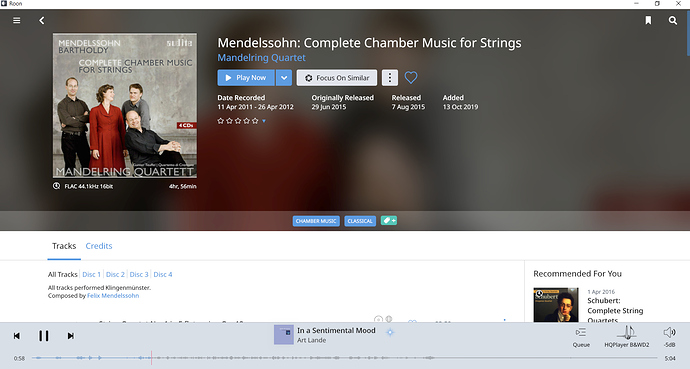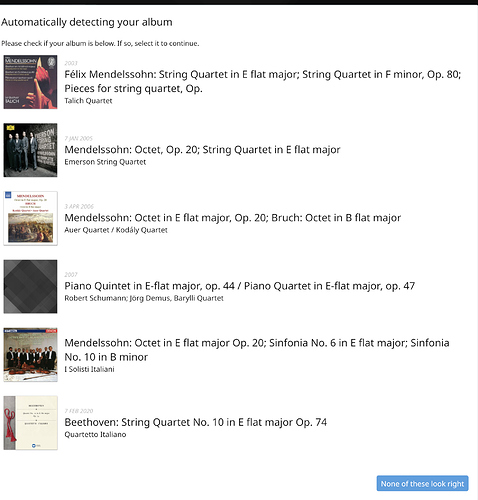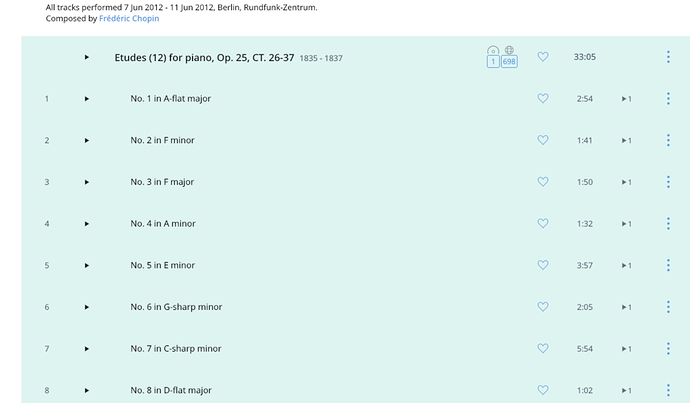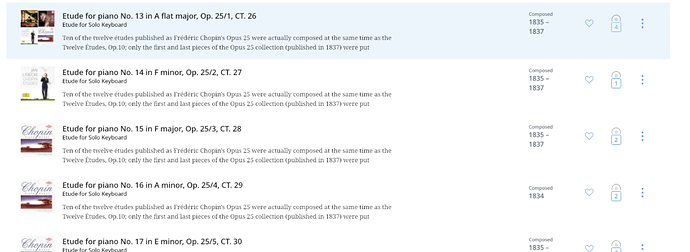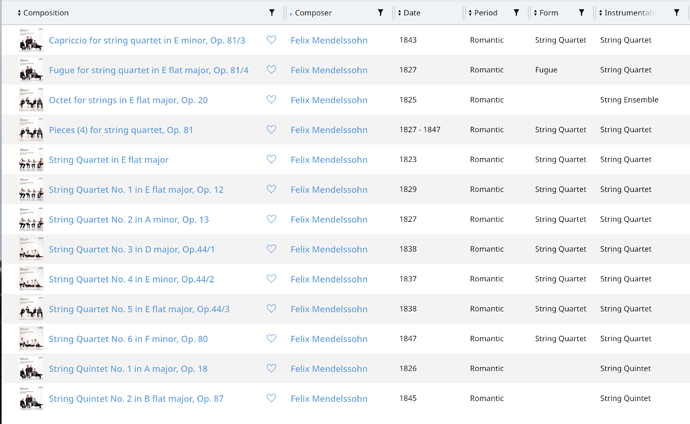I would proceed with caution: first, make a backup of all your files with metadata you’ve filled, then try deleting one field at a time, starting with whatever field you’re using that groups movements together into compositions, and see how you like the results. If it’s not doing what you want, revert to your backup.
Yes, Thanks.
He’s fantastic. His instructions got me to within a hair’s breadth of understanding custom fields.
I’ll do as you kindly suggest. Does he know Roon?
I’ll start with the Plists - not sure which of those two, though…
He is familiar with Roon. There are several custom Roon features.
Hi Tony!
Thanks so much for your help… I really am among friends here.
At the moment, I am pursuing two paths - thanks to everyone who’s jumping in to help:
- letting Roon do the work… not very successful so far; but I’m pretty new to this - so hopeful

- editing the tags myself - which I enjoy doing
Two grabs attached - the second of which strongly suggests that I’m missing Work Name and Part, doesn’t it.
- a listing in the Finder of the three Opus 44 4tets actually retrieved from a copy of the original files I made before I did any kind of tagging at all… They are part of what I bought and download from Audite
- a screen shot of what roon thinks are in your file tags - as you asked for here - for Mendelssohn Opus 44/1, the Molto allegro vivace first movement
I’m very grateful for everyone’s help. In the new, set aside Library to experiment with, I’m going to try to get Roon to do the work - since everyone here encourages me to believe that it can  .
.
Then move on to tagging myself…
Yes. You have not configured Yate right and you are not writing the WORK/PART tags. That is why roon is not picking them up.
But there are other things wrong. In the TITLE tag, you have only the PART information. It is better to put both the WORK and the PART in the title separated by a colon “:” or dash “-” separator. So in your screen shot that would be:
String Quartet in E flat major, Op 12: Molto allegro vivace
Roon can also be fussy about the composition labeling conventions it will consistently recognise. You can search for your composition on allmusic.com and that will tell you the optimum composition structure roon would prefer. You may find that the allmusic.com composition naming conventions are very different to your home grown convention and that roon may simply not understand or have any way of parsing your convention. Depending on your tagging habits you may have a very long road ahead of you to converge your tags to something roon understands.
From what I can see of your screen shots, roon will have no problem identifying that Manderling Quartet / Mendelssohn album and structuring it correctly if you meet roon halfway. This is a very good example where it should not even be necessary to write WORK/PART tags but it seems your tagging conventions are really giving roon problems and roon hasn’t enough to go on to identify your albums. Once you have done a minimum of re-editing of the TITLE tags you should be able to manually identify that Manderling Quartet album like this:
My advice is to do the minimum editing necessary for roon make the identification in the above screen shot and only resort to more advanced editing like WORK/PART when you have no choice.
@Tony_Casey - thanks. That’s really helpful!
I’ve spent an engrossing couple of hours playing with Yate setting WORK and PART after importing the Plist files etc…
Are those really the only two fields which I ever need to add and edit in Yate for Roon?
If so, I have a template for all such future tagging 
I have read and re-read what you kindly say bout approaching this the wrong way.
In fact, this afternoon, I first eliminated any chance of interference from previous changes which I (might have) made (in Yate ) - determined to see how well Roon handles the files ‘unaided’.
I restored from Time Machine the untouched - ever - original files of the files for one set of the Mendelssohn Opus 44 String 4tets. They are part of what I bought and download from Audite.
I then set ‘Prefer Roon’ for all tags everywhere.
But Roon really got next to nothing in terms of revised or better tagging.
So - once I know exactly what I’m doing with those Custom fields for Roon in Yate, I think that may be the way to go.
Your help much appreciated  .
.
@tripleCrotchet - that’s great advice; thanks!
I shall do just as you say.
Referring to your screenshot: is that from a Setting in Roon, or something you have annotated, please?
Then I’ll contact Barry to make sure I’ve followed the correct workflow - and Yes, Yate is complex, but I’ve made myself several docs to prod my memory each time - to match Yate fields to what Roon will recognize - as I’m now convinced that what you say is indeed exactly what has been going wrong.
But I like your two-step approach. Thanks again!
No, that is standard roon. I don’t have exactly your Mandelring Quartet album. I have the 4CD box set but this is how I got there and you will have to do something similar.
Initially roon cannot identify the album because roon cannot make any sense of the Audite tags. Downloads from the labels are usually the worst. In extreme cases there are no tags at all. Rips of a CD are usually much better tagged as the ripping software has matured over several decades and there is a large infrastructure for the ripping software to lookup online databases and autotag your rip. You can always re-tag your download with an auto-tagger which takes a similar approach to CD rippers by looking up mature on-line databases. Songkong, for example, will even auto-tag in a completely roon-compliant way so that roon has no surprises when trying to identify your album.
The end result is that a download from a label like yours, that hasn’t been post-processed, may simply have insufficient tags for roon to make any sense of it. So roon will not be able to auto-identify it and it will be presented as unidentified as follows. My guess is a lot of your albums look fairly rubbish like this:
However, if you click on “unidentified” you will be presented with a screen like this:
Press on “identify album” and in a surprising number of cases, even with very few tags, you will be presented with a screen like the following:
Scroll around until you find the album that most closely matches yours. In my case it is the first one on the list, in your case I think it is the second. If I click on the first choice I get to my original screen shot above:
Then, when I click save, my original mess of a screen, with hardly any editing input from me is turned into the below, with all the compositions hierarchically structured. If you can navigate through the screens like this you should end up with a properly identified and structured album with sometimes no editing or re-tagging at all.
As a rule of thumb, roon does require some minimum tags like album title and artists and track and disk numbers. I often find that tagging the record label and/or record label catalogue number helps a lot, and will certainly not bother tagging complex composition names if I can possibly get away with it, only as a last resort.
Thanks, Tony!
I really appreciate that you’ve gone to so much time and trouble to illustrate what was - I’m ashamed to say - an option (Unidentified > Identify Album) which I’d missed  .
.
Again I replaced the contents of my Roon test library folder with the original downloaded files. No tagging at all by me.
You’re right, I think it must have been a box set.
But I downloaded its FLAC files from here a few years ago.
This is what Opus 44 looks like in the Finder:
The fact that - as you point out - the only tags in those files at the moment I tried the manual identification from within Roon were those perfunctorily added by, presumably, the Audite press team (!) helps explain, I’d have thought, why the identification process failed. No Mandelrings at all:
But I’m not discouraged. I’m more than willing manually to start some tagging once I’ve read this FAQ page again - to prime Roon’s pump and take it from there with Work and Part.
I’ve written to Barry to ask him to confirm my suggested workflow.
Thanks again for your help!
Obviously no one else sleeps 
The basics …
Roon understands Work and Composition, prefers Work
Roon understands Part and Movement, prefers Part
Any other tags in this area are ignored. Grouping for example
Best bet is use Yate to check a few Albums then import that one and see what Roon does
The advise is all the above
That’s really helpful, Mike!
Yes, although I haven’t really pushed Work and Part to their limits, and certainly not made them ‘superior’ to Composition and Movement, I completely understand the conventions you’re advising thanks.
And have had some success to-day getting Yate to retag accordingly.
You’ve all pointed me in the right direction. Shall continue to benefit from it and all of you. Much appreciated!
I have never used Yate as I am windows but I hear good things about it I use SongKong
In the manual identification did you try using the American spelling Manderling Quartet instead of the German spelling Manderling Quartett? If you press the button “none of these look right” roon will give you the opportunity to refine your search and present a much longer list of options.
If that doesn’t work, then it is not clear from your screenshot if you have done the following:
Have you put all the Op. 44 quartets in one folder? You are showing all three of them. But Vol. 2, from your link, only has Op. 44/1 and Op. 44/2, together with Op. 80. Op. 44/3 is on another disk, Vol. 3. That is why you have two track 1’s and two track 2’s in your screen shot and the movements of all your quartets have all been “shuffled”.
Roon works in terms of albums, so if you did restructure your folders, as many do, so you could group all 3 quartets of Op. 44 together when browsing folders, you need to put all your Manderling/Mendelssohn albums back together in their original structure as they were originally downloaded. Roon simply will not work if you start restructuring your albums in that way. You have to retain the original album structure in your folders. On disk, Vol. 2 should look something like this:
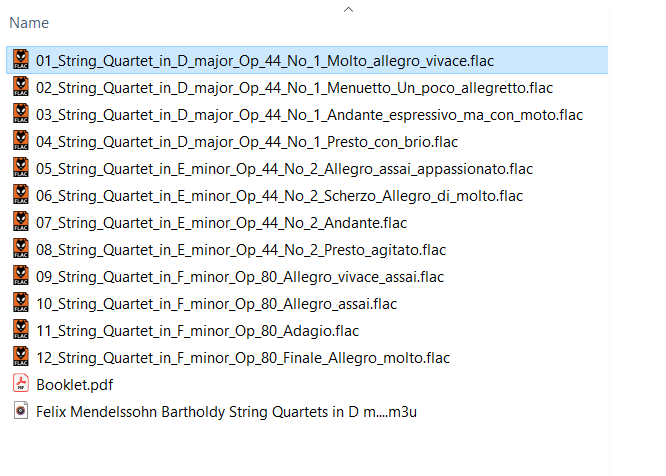
This is very different from your screen shot. If you reconstruct the original downloads with their original track numbers and disk numbers, roon will import and identify these Manderling albums with no further intervention on your part. You shouldn’t be having these problems so it must have something to do with the edits you made in the last couple of years to make these downloads work with your previous player.
If that doesn’t work, we are running out of options. These Audite downloads should be recognised by roon with no edits from you. If you have been making edits your only option now is to go to allmusic, find your albums, and copy into your tags exactly what you see. This will now be a lot of work and of course will only work if Yate has been configured properly to work with roon and it is writing the tags you think it is writing. You must especially make sure that all the track numbers and disk numbers are correct. All this editing will require a learning curve with Yate that from your posts you may not have yet.
TBH, before going into tagging hell, I would have by now just put it all down to experience and redownload the album(s) from Audite. They should just import into roon directly with absolutely no intervention on your part. Once you have done that it will be much easier to figure out which of your edits and your tagging habits are causing roon problems and avoid that in the future.
I have a question if I may as this thread has been useful to me to help understand how this works.
I don’t seem to be having the issues that the OP is having but am a little confused by one aspect (an answer to this may help the OP too!).
Take Chopin Etudes
I have the Chopin album by Lang Lang which Roon has identified correctly.
When I view for example the OP.25 work it all shows nicely with the Work and Parts correctly displayed.
In my composition viewer I see this
However I also have these Etudes performed by others displayed separately, where each part is a separate work. These are on albums also recognised by Roon.
e.g.
Now ideally I want to combine these as currently I am seeing the same work in 2 places, despite Roon being aware of he albums.
Any recommendations on how best to deal with this?
Thanks
There is no one size fits all answer to this.
It is common on recital type “live” albums or compilations for one or two or maybe three of the 12 Etudes to be played in no particular order. I actually like to keep them seperate because they work much better that way in a shuffle, a playlist, or roon radio where I just want to hear one of the Etudes interspersed with other excerpts from other works. With famous Etudes, Preludes, Nocturnes etc. roon will also make an identification independent of the grouped Opus with much more detailed composition analysis etc.
But you can always force roon to group these etudes by using WORK/PART tags if you wish. I also do this even where there is an incomplete Opus or composition of maybe 4 or 5 of the Etudes (or Preludes or Nocturnes or whatever), but the most obvious place you will want to do this is on rather academic disks which tend to record all (12) components of an Opus even if they were never played that way in the composers day. The easiest place to do that is from the album view. Once you have grouped all the PARTs you wish under the WORKs you wish then you can roll up the compositions further by “merging” all the compositions. If you go to the composition viewer, that is usually the easiest place to merge your compositions.
So I often do both and the answer to your question is “it depends”.
You have found Roon’s snag 
The Lang Lang album contains ALL 12 Etudes op.25 . Your other examples a probably an odd Etude say as a mixed recital but NOT all 12
Simply if all 12 are together you get the Etudes(12) op.25 , if not all together you get the individual work Etude op.25/8 etc.
It’s a quirk of Chopin you will find similar quirks with Watzes, Preludes etc
The question is op.25 a Work with 12 Parts or a Group of 12 Works with NO parts . Roon doesn’t support a Grouping Tag alas
In my legacy system (JRiver) I treat each etude as a composition and have a Tag Grouping which gathers them together
It’s not Roon it’s Roon’s metadata supplier
Oh for consistency— Clear As Mud ?
Edit — Tony snuck in while I was typing 
Wonderful.
Yet again! Thanks, Tony… what a really helpful reply! You’ve solved it for me, I’m 99% sure.
I did as you suggested and ‘rebuilt’ the Mendelssohn collection from my untouched (since September 2015) originals. I could see they were originally a box set of four CDs, which Audite made available as four downloads here.
Don’t tell anyone - but I actually put each CD in its own subfolder… ‘CD1’, ‘CD2’ etc.
Is that unlikely to cause trouble?
I then set that experimental directory with the four CDs as Roon’s Library (so useful that Roon supports such ‘testing’).
This is the result:
With this as the list of compositions which was causing so much anguish at the weekend:
You can imagine how pleased I am 
Thanks to you and everyone else who’s been kind enough - and so generous with their time - I’ve learnt two important lessons:
- Roon is much more intelligent, reliable and comprehensive than the links of MusicBrainz. I guess that’s what happens when you pay for it - which I’m getting more and more inclined to do now (still in the trial period); and switch from Audirvana
- that I must keep the original folder structure album-by-album as released by the label itself; if I do that, I can leave it up to Roon.
I hope I may be forgiven for doubting - until now - the ability of an online system actually really to understand the way classical music works. From Amazon with ‘Artists’ like Prokoviev, to Discogs (and iTunes) where everything is a ‘song’, to MusicBrainz which seemed to lack most of what I looked for.
I don’t think Yate has become - or may ever become - redundant (and Barry is fantastic, helping at every turn)… I may always want to tweak.
But - am I not right to think that Roon really can deal very well with classical music - provided I leave it to its own devices?
Very much appreciated, Tony!
No, for your future reference that is exactly what roon is expecting you to do with a box set.
Probably best to leave it at that and play a few tracks and drink a cold one and get ready to do the next one. But you do now have a choice. If you prefer you can “merge” the single volumes into a single 4CD box set. That is really down to your preferences and in many cases when the boxes grow larger to 30 or 60 or a 100 or more CD’s you will prefer to leave them separate like this with individual art work. Otherwise they become unnavigable in roon.
But just as a reference point you can merge these disks by highlighting them with a right click. An “edit” button will appear in the top right. Click that and click “merge” from the next screen. This will only work if each disk is numbered 1/4, 2/4, 4/4, 4/4 or similar. But as I say, revel in your victory and leave that for another day.
Tony,
Go it! Thanks. Yes. My worry was that putting hundreds (eventually thousands) of individual files not grouped in any way into the same directory at the same level would be asking for trouble.
I’ve now re-assembled my Roon directory under ~/Music/ and am, honestly, still amazed at how well Roon does what it does ![]() .
.
I can always fall back on PART and WORK tagging if/whenever I have to. But Roon seems to know everything.
Is that because it reads (manufacturer) tagging more intelligently and comprehensively than I (or Yate) can?
Or because Roon has its own database drawing on a much more accurate and comprehensive store than is generally available?
Is that where AllMusic comes in?
Is it really not too good to be true?
Roon integrates metadata licensed from AllMusic/Rovi, Musicbrainz, and possibly other metadata providers. Part of what you pay to Roon is for their metadata licensing and integration, which I can tell you from professional experience is complex and expensive. When it works, it’s magical, for sure ![]()

